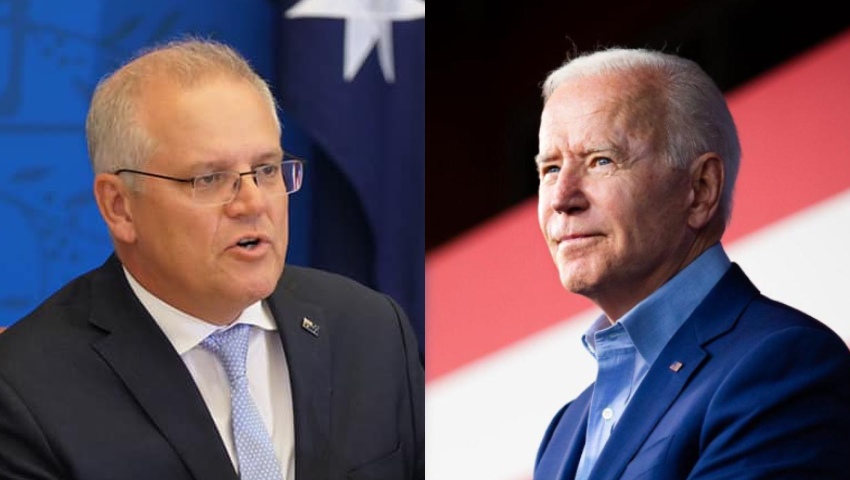Will the Biden administration fulfil its promises to Australia and its regional neighbours as they contend with a coercive China?
To continue reading the rest of this article, please log in.
Create free account to get unlimited news articles and more!
Australia’s Foreign Minister Marise Payne and Defence Minister Peter Dutton will soon arrive in Washington for bilateral discussions with their counterparts as part of the annual AUSMIN conference.
The Chinese Communist Party’s (CCP) increasingly aggressive geostrategic posture will likely lead the agenda, with Australia’s representatives expected to seek assurances from the US.
According to Dr John Lee, non-resident senior fellow at the United States Studies Centre, Ministers Payne and Dutton will look to materialise President Joe Biden’s commitment to strengthening collaboration.
Dr Lee notes Australia’s continual reliability as a US ally, and observes that it is one of the few countries in the Indo-Pacific “prepared to directly counter Beijing’s illegitimate or coercive behaviour”.
Given Australia’s firm stance, security assurances from the US are critical as the People’s Liberation Army (PLA) flexes its muscles.
“The PLA’s primary target is Taiwan, but we all know its ambitions won’t end there,” Dr Lee continues.
“Beijing has been clear that it will use whatever means available, including the use of force, to achieve its objectives in the East and South China Seas.
“It’s become increasingly clear that we have less time to prepare and respond to this threat than we assumed just a few years ago.”
The analyst points out that Australia’s multi-decade strategy to bolster defence capability may be outdated, given Chinese President Xi Jinping “is nothing if not impatient”.
“The odds are increasing that Beijing will use force — perhaps in Taiwan — in a few short years,” Dr Lee adds.
“If Australia is to help shape the environment or contribute meaningfully to American-led efforts to deter or respond to the martial intentions of China, America must accelerate Australia’s development and deployment of these weapons.”
Australia’s inclusion in the congressionally-mandated National Technology and Industrial Base following the 2017 election, he writes, set the scene for accelerated military development.
However, Dr Lee observes “stringent export controls” continue to be applied to trusted US allies. As such, AUSMIN must lobby for their removal.
According to Dr Lee, in return, Australia can offer the US access to military facilities, stockpiles of fuel, inventories, and munitions in dispersed locations.
“Australia is superbly positioned in geo-strategic terms as a southern anchor for American and allied forces away from China’s periphery,” he notes.
“Such valuable strategic real estate should be better utilised.”
Dr Lee also expects Minister Payne and Dutton to seek support from the Biden administration for Australia’s criticism of China’s economic coercion.
“America can lead a coalition of nations to identify and call out Chinese economic coercion, join onto World Trade Organization actions against China, and impose collective measures against China outside of the WTO system,” he writes.
“Additionally, many developing countries in the Indo-Pacific face a long road to recovery from the devastation wrought by COVID-19, creating opportunities for China to use its state-directed resources to offer largesse in return for subservience.
“They need America and its allies to provide an alternative.”
Dr Lee goes on to stress that the AUSMIN discussions must be substantive to thwart Beijing’s narrative.
“Beijing consistently characterises American alliances as Cold War relics that will prove ineffective in preventing China’s inevitable rise and dominance. Its goal is to sow doubt about the resilience, strength, resolve and wisdom of the world’s liberal democracies, and America most of all,” he writes.
“If AUSMIN delivers little of substance, it will be offered as more evidence the democracies are in retreat and that this administration does not have what it takes to turn the tide.”
Dr Lee concludes: “After recent events in Kabul, faith in American leadership is faltering and needs to be righted urgently. In Australia, America has a willing and proven ally to help it do just that.”
Get involved with the discussion and let us know your thoughts on Australia’s future role and position in the Indo-Pacific region and what you would like to see from Australia's political leaders in terms of partisan and bipartisan agenda setting in the comments section below, or get in touch with

 Login
Login







